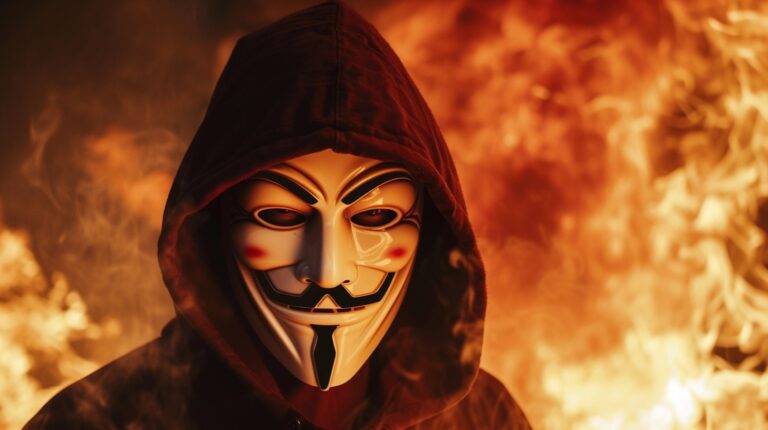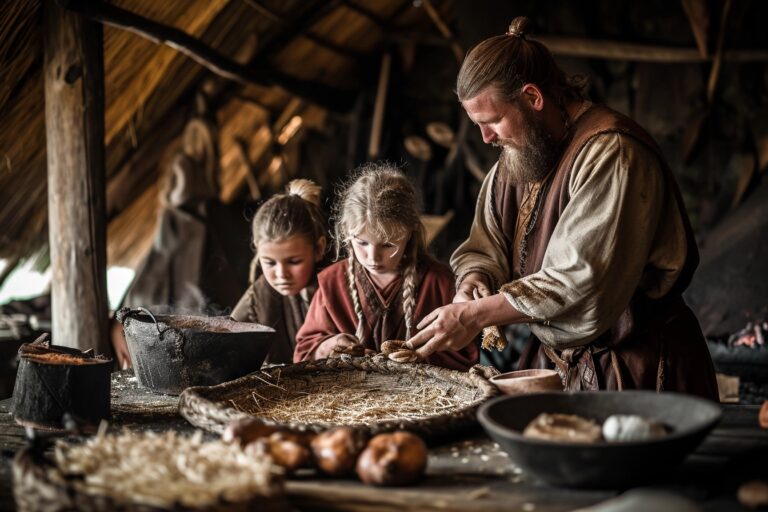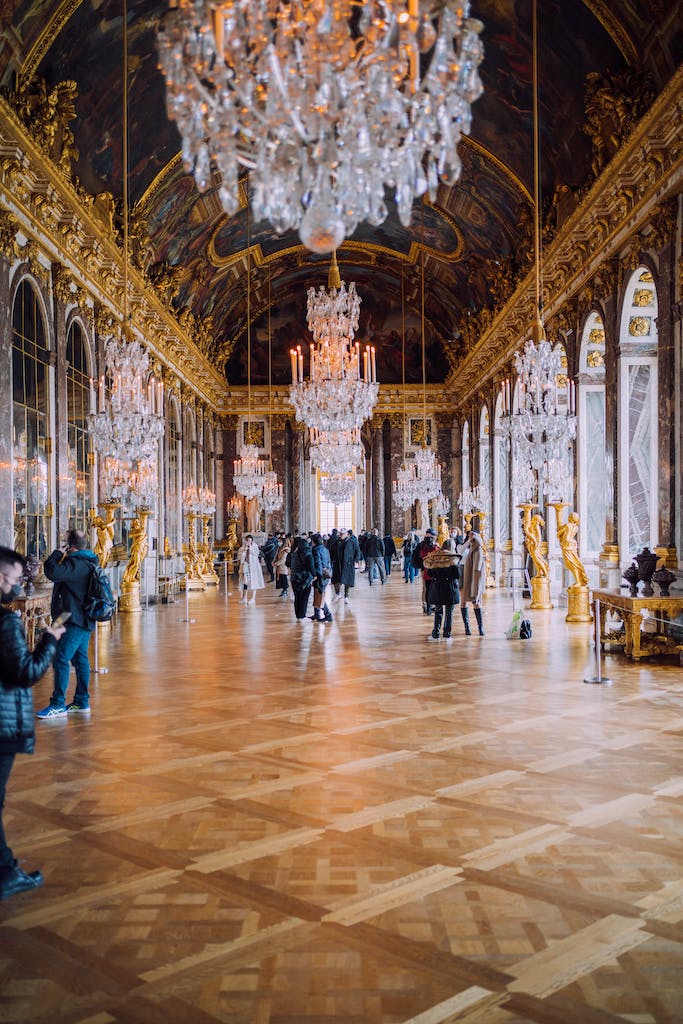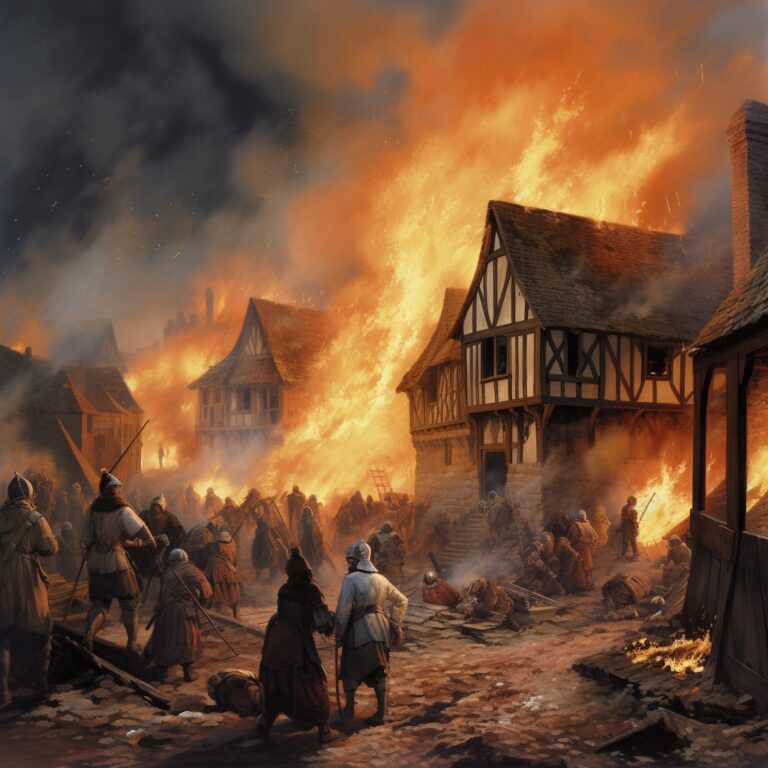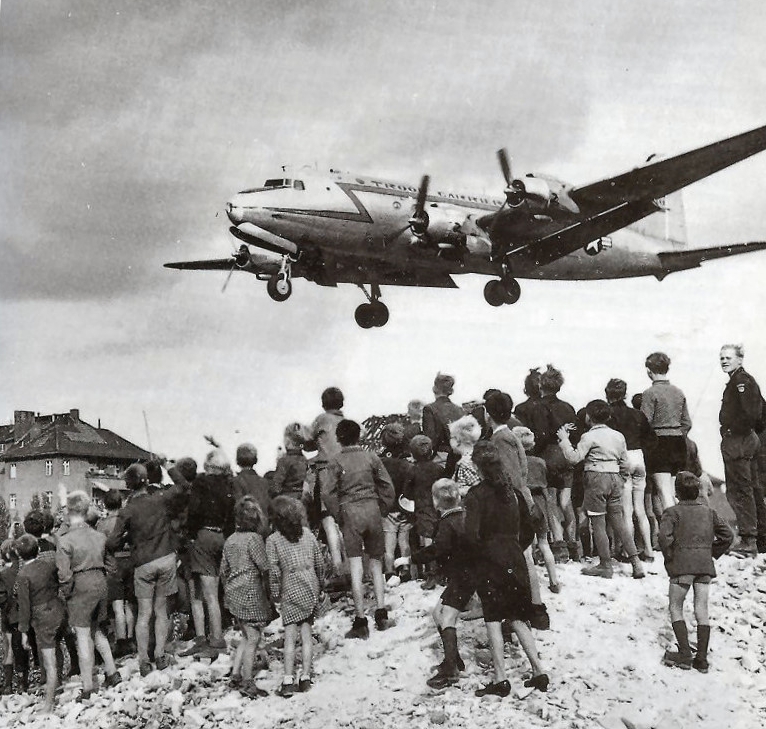
A cold wind whipped through the streets of Berlin as Richard and Grace emerged from the shimmer of the time machine, the familiar hum fading behind them. Gone was the warmth of their grandparents’ attic, replaced by the stark reality of a war-ravaged Berlin. Rubble lay strewn everywhere, skeletal remains of buildings that once housed lives and dreams. The air hung heavy with the smell of burnt wood and something else – a lingering sense of loss.
“Wow,” Richard breathed, his breath misting in the crisp air. “It’s like walking through a graveyard.”
Grace, ever the pragmatist, adjusted the worn knapsack slung across her shoulder. “We need to find somewhere safe to blend in. Remember, observe only, no interfering.”
They navigated the maze of debris, their footsteps crunching on shattered concrete. People shuffled past, their faces etched with weariness. Women, some with makeshift slings holding injured arms, pushed handcarts laden with meagre scraps. Children, their eyes hollow with hunger, played amidst the ruins, their laughter tinged with a haunting emptiness.
Suddenly, a loud roar filled the air. They looked up to see a Douglas C-47 Skytrain, its silver wings emblazoned with a star and stripes, thundering low over the cityscape. It dropped cargo, parachutes billowing white against the grey sky.
“The airlift!” Richard exclaimed. “They’re actually flying supplies in.”
Grace nodded, a spark of hope flickering in her eyes. “This is a pivotal moment. The Soviets are trying to force the Allies out of Berlin, but the airlift is showing they won’t give up.”
They approached a group of women gathered around a fallen lamppost, eagerly waiting for the parachutes to descend. One, her face lined with wrinkles that spoke of a life lived through hardship, caught their eye.
“Entschuldigung, sprechen Sie Englisch?” Richard asked hesitantly, his high school German kicking in.
The woman’s eyes widened in surprise. “A little,” she replied cautiously. “Where are you from?”
“We’re from England,” Grace explained. “We came here to see… to understand what’s happening.”
The woman sighed, her shoulders slumping. “It’s hard to understand,” she said in broken English. “We lost everything. Our homes, our families… but the Allies, they are keeping us alive.”
She pointed towards the sky, where another plane was approaching. “They bring food, medicine, even coal to keep us warm. We are grateful, but we fear for the future.”
As they spoke, a young boy, no older than ten, approached, his clothes ragged and his face smudged with dirt. He clutched a tattered teddy bear, its stuffing spilling out.
“Mama, will the bad men ever leave?” he asked, his voice trembling.
The woman knelt beside him, her eyes filled with unshed tears. “I don’t know, Liebling,” she whispered, pulling him close. “But we must have hope. We must believe that things will get better.”
The weight of the woman’s words hung heavy in the air. Richard and Grace exchanged a look, a silent understanding passing between them. This wasn’t just history unfolding before their eyes; it was a human drama, a story of resilience and hope amidst unimaginable hardship.
They spent the rest of the day with the women, helping them gather the airdropped supplies. As the sun began to set, casting long shadows across the ruined city, they said their goodbyes.
“Thank you for sharing your story with us,” Grace said, her voice soft.
The woman smiled faintly. “Thank you for listening. You give us hope, too, knowing that the world has not forgotten us.”
Berlin, 1948, was a city divided, both physically and politically. “This does not have a good feel about it Grace” Richard observed, his gaze sweeping across the stark line that bisected the city.
Grace nodded, a frown creasing her brow. “It doesn’t. Lots of destruction even after three years since the last bombing. And I can sense unease among the Berliners”
They approached a bustling marketplace, a cacophony of shouts and bartering filling the air. Here, life seemed to go on, albeit under challenging circumstances.
Suddenly, a young man with fiery red hair and a defiant glint in his eyes bumped into them, nearly sending Richard sprawling.
“Entschuldigung!” he exclaimed, his voice laced with frustration. “Didn’t see you there.”
“No worries,” Richard replied, brushing himself off. “We’re just tourists. What’s going on here?”
The young man, introducing himself as Erich, explained the situation. Following World War II, Berlin had been divided into four zones, each occupied by a different Allied power – the United States, Britain, France, and the Soviet Union. However, tensions had been rising, particularly between the Soviets and the Western Allies.
“The Soviets are trying to squeeze us out,” Erich explained, his voice low. “They blockaded the city three months ago, cut off all land access. They want us to give up, to let them take control of all of Berlin.”
“But how are people surviving?” Grace asked, her brow furrowed in concern.
Erich pointed towards the sky. “The airlift,” he said with a mix of awe and apprehension. “The Americans and British are flying in supplies – food, medicine, even coal. It’s a lifeline, but we don’t know how long it can last.”
Richard and Grace spent the next few days immersing themselves in the city, talking to people from all walks of life. They heard stories of hardship and resilience, of families torn apart by the division, and of the constant fear of what the future held.
They also witnessed the airlift first-hand, the steady stream of planes carrying essential supplies, a testament to the unwavering commitment of the Western Allies to the people of West Berlin.
American and British air forces flew over Berlin more than 250,000 times, dropping necessities such as fuel and food, with the original plan being to lift 3,475 tons of supplies daily. By the spring of 1949, that number was often met twofold, with the peak daily delivery totalling 12,941 tons
In a quiet corner of a cafe, they met an elderly woman named Frau Schmidt. She spoke of the war, the fear and loss, and the hope that flickered amidst the darkness.
“We were so naive,” she said, her voice heavy with emotion. “We thought the war was over, that peace had finally come. But the fighting has just taken a different form.”
They navigated the crowded streets, their eyes drawn to the makeshift stalls lining the sidewalks. Women bartered meagre possessions for basic necessities – bread, potatoes, even coal. The prices, scrawled on scraps of paper, were exorbitant, reflecting the desperation and scarcity caused by the blockade.
They approached an elderly man huddled near a flickering gas lamp, his face etched with worry. “Excuse me, Herr,” Richard started, using his basic German. “We were hoping you could tell us what’s happening here.”
The man looked up, his gaze wary. “You foreigners?” he asked, his voice hoarse.
Richard and Grace nodded, explaining their purpose and their desire to learn. The man’s initial suspicion melted away, replaced by a weary acceptance.
“Life is hard,” he sighed, gesturing to the empty shelves of a nearby shop. “The Soviets control everything now. They force us to work in their factories, yet ration out our supplies. It’s barely enough to survive.”
He pointed towards a group of young men loitering at the corner, their faces sullen. “Many have given up hope,” he said, his voice dropping to a whisper. “They turn to the black market, trading anything they can for a scrap of food or a cigarette.”
Richard and Grace spent the next few days exploring the city, witnessing the stark effects of the Soviet occupation. They saw schools converted into indoctrination centres, young people pressured to embrace communist ideology. Fear had become a pervasive force, silencing dissent and stifling any semblance of freedom.
In a small, overcrowded apartment, they met a family struggling to make ends meet. The father, a former teacher, had been dismissed for refusing to teach the prescribed communist curriculum. The mother, working tirelessly to keep her children fed, spoke of their constant fear of informers and reprisals.
Their experiences painted a stark picture of life under Soviet rule. It wasn’t just about economic hardship, but the systematic suppression of individual liberties and the constant pressure to conform.
As they stepped back into the swirling vortex of the time machine, the weight of what they witnessed settled upon them. The Berlin they had just left was a testament to the devastating consequences of the Soviet occupation, a reminder of the human cost of political ideologies and the enduring struggle for freedom.

